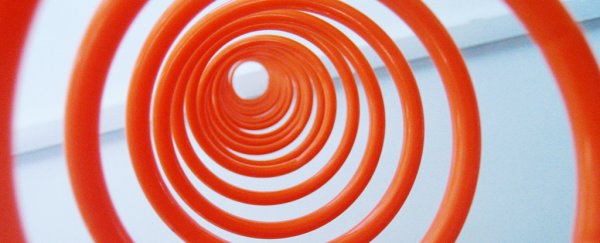While hypnosis is often regarded as little more than a clever party trick, new research suggests that some of us really do feel we've lost control over our own actions after being hypnotised.
Using an established test designed to measure self-agency – the sense that our own actions are actually down to us – participants were shown to be more likely to feel their movements were involuntary after hypnosis.
It's a small study and is a long way off showing that hypnosis works the way many people think it does, but it suggests the practice might have a subtle effect on our consciousness that's worth further investigation.
To test this, researchers from the Sackler Centre for Consciousness Science in the UK looked at the effects of intentional binding: the idea that when we do something that directly causes something else, like pushing a button to make a sound, our minds perceive those events to be closer together in time.
Previous studies have shown that if we think two events – like a button push and a sound – are unrelated, our perception is ever-so-slightly skewed to perceive them as taking longer.
Here, researchers asked 18 volunteers to judge the time between a series of button presses and subsequent outcomes.
As expected, when the push was involuntarily triggered (with a piece of string attached to the finger), the volunteers thought more time had passed – an average of 176 milliseconds, versus an average of 91 milliseconds when they pushed the button themselves.
What's interesting is that when the participants were asked to push the button after being hypnotised, their perception of the gap averaged out at 156 milliseconds, closer to the involuntary figure than the voluntary one.
In the words of the researchers, that correlation is "evidence for hypnotically induced changes in [our] sense of agency".
"This is the most objective evidence yet that people who are hypnotised feel that their actions are not under their own control," researcher Peter Lush told Clare Wilson at New Scientist.
To be clear, the study used a small sample size, and participants were picked in advance as being susceptible to hypnosis. For that reason, the scientists do concede these findings may not apply to the generation population.
But even with those limitations in mind, the research still suggests that after being hypnotised, we can get a greater sense of not being in control over our own actions.
"Hypnotically suggested actions behave more like genuinely involuntary actions than like voluntary actions in an implicit measure sensitive to agency," at least in this small subgroup of people, the researchers conclude.
The study team says it's a much more accurate way of measuring the effects of hypnosis because it happens on the subconscious level, and is less ambiguous than self-reporting or brain-scan analysis.
And the scientists think further work based around intentional binding could help us better understand mental illnesses like schizophrenia, where people no longer feel in control of what they're doing.
Meanwhile we're continually learning more about how hypnosis affects the brain and why some people are more easily hypnotised than others.
A Stanford study published last year found that being hypnotised affects brain activity and connectivity, including decreased functionality in the part of the brain that links doing something and being aware of doing it.
And more recent thinking suggests hypnosis can trigger intentional actions at a subconscious level – which would explain how hypnotised people might feel like they're acting involuntarily, when at some level they're still in control.
"At the unconscious level, the action is intended, but is experienced as involuntary because the mental state that would usually be directed at it to form the conscious experience of intending is inaccurate," explained Peter Lush from the Sackler Centre last year.
There's no easy way to prove if someone is really hypnotised – but if they are, they might be more in control than they think.
The latest research has been published in Psychological Science.
